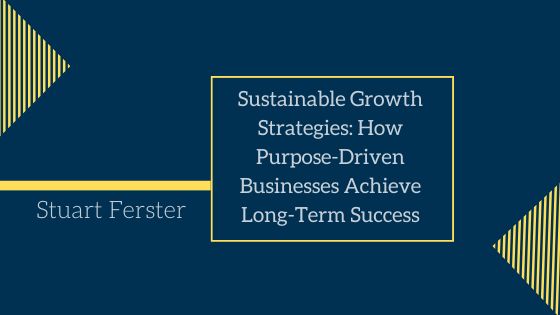In an era where consumers, investors, and employees demand more from the companies they engage with, purpose-driven businesses are emerging as clear leaders. These organizations go beyond profit to align their growth strategies with values that promote sustainability, social responsibility, and long-term impact. By integrating purpose into every aspect of their operations, they are proving that doing good and doing well are not mutually exclusive; they are mutually reinforcing.
The Rise of Purpose-Driven Business
Modern businesses are no longer judged solely by their financial performance. Stakeholders expect companies to take a stand on issues such as environmental protection, ethical labor practices, and community development. This growing expectation has given rise to purpose-driven organizations, those guided by a mission that extends beyond short-term profits.
When businesses operate with a clear sense of purpose, they foster deeper connections with customers, build stronger brand loyalty, and attract employees who are motivated by meaning, not just paychecks. This alignment between values and operations creates a sustainable foundation for growth that withstands economic fluctuations and market disruptions.
Purpose as a Strategic Advantage
Purpose is more than a marketing message; it is a strategic differentiator. Companies that embed purpose into their business models are better equipped to identify new opportunities and manage risks. For example, organizations focused on sustainability often discover innovative ways to reduce waste, improve efficiency, and lower operational costs.
Purpose also drives innovation. Businesses that prioritize environmental or social impact tend to adopt forward-thinking technologies and processes that give them a competitive edge. By addressing societal challenges through their products or services, they simultaneously open new markets and strengthen their long-term viability.
Building Trust Through Transparency
One of the most powerful outcomes of a purpose-driven approach is trust. Transparency around values, sourcing, and sustainability practices builds credibility with consumers and investors alike. Today’s audiences are quick to recognize authenticity, and equally quick to identify performative efforts.
Companies that genuinely integrate purpose into their decision-making earn lasting loyalty. For instance, brands that invest in renewable energy, fair trade sourcing, or community programs not only reduce risk but also cultivate goodwill that can sustain them through challenging times.
Long-Term Value Creation
Sustainable growth is rooted in long-term thinking. Purpose-driven businesses focus on creating enduring value rather than chasing short-term gains. They prioritize stakeholder well-being, reinvest in innovation, and nurture relationships that support ongoing success.
Moreover, studies consistently show that companies with a strong sense of purpose outperform their peers over time. This success stems from employee engagement, customer retention, and investor confidence, all of which are driven by the company’s commitment to a greater mission.
Conclusion
Sustainable growth is no longer about expanding as fast as possible; it is about growing with intention and integrity. Purpose-driven businesses are redefining what success looks like by balancing profitability with positive impact. By aligning strategy with purpose, these companies are building resilient, future-ready organizations that not only thrive in today’s market but also contribute meaningfully to a better world.

